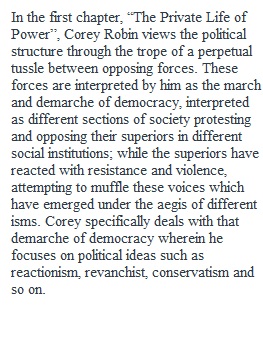


Q For your ninth essay I am asking you to read the first chapter of Corey Robin's excellent book The Reactionary Mind: Conservatism from Edmund Burke to Donald Trump. Your job this week is to put your entire skillset to work. I want you to read the chapter as a philosophical text with a clear argument: a thesis, premises (reasons for believing the thesis), and evidence to support the premises. You should organize your essay to answer the following questions in approximately 750 words: • What do you think the text is arguing? • What evidence is there in the text to support your reading? • What is the meaning of the text's argument? Why? • What implications are there if the argument is true? Why? • Could the text be read as meaning something else? • What reasons might someone give for holding this alternative reading of the text? • Why do you find your original account of the argument and meaning of the text more persuasive than alternative readings? Finish your essay by taking a position of your own. What is your thesis? What are your premises (reasons for believing the thesis is true)? What evidence do you have? Why might someone disagree with you? Why are you unpersuaded. This articulation of your own position should be approximately 250 words in length, and should refer back to the preceding philosophical analysis. Please treat this assignment as one 1000 word essay. Be organized. Consistently follow a stylesheet like MLA, APA, or Chicago. You are encouraged to reference the work of Weston in providing an analysis of what is going on in the text.
View Related Questions